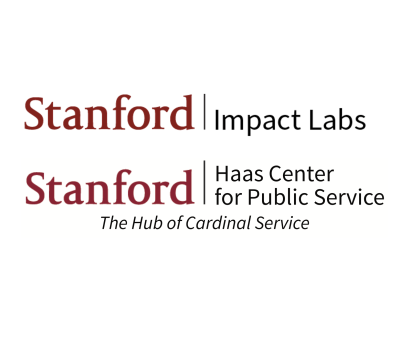Scholars in Service Program
Scholars in Service: Call for Applications
A program of Stanford Impact Labs in partnership with the Haas Center for Public Service
Note: This call for applications is for Scholars in Service placements envisioned between June 2021 and September 2022.
We are pleased to announce a call for applications for the second annual (2021-2022) Scholars in Service program as part of the pilot phase of Stanford Impact Labs in partnership with the Haas Center for Public Service.
The Scholars in Service Program is intended to complement and extend existing leave and sabbatical opportunities at Stanford with a primary focus on the exchange of learning and expertise around an identified social problem. Financial and staff resources will be provided to support placements, for a minimum of one quarter and up to four quarters, in public sector agencies and nonprofit organizations.
Placements are designed to support in-depth, hands-on learning about a social problem and existing approaches to address it, with the potential to help generate new research insights and/or research applications. The ideal placement will enable the exchange of complementary skills and expertise, and should both add value to the hosting organization and help to advance the faculty member’s thinking about his/her own research. Applicants can identify and negotiate their own partnerships, or work with the Stanford Impact Labs and Haas Center team to identify an appropriate placement.
Financial resources: We will provide funding for a minimum of one quarter and up to four quarters of leave for salary replacement and benefits, as needed. We may also cover, with pre-approval, associated direct costs, which may include travel, temporary housing, and/or office and field resources.
Staff resources: Our team can help to identify credible and realistic partner organizations for placements when the applicant does not already have a specific placement in mind. For all finalists, we will review, vet, and work with the potential host organization to ensure they are a good fit for the purposes of the leave program and faculties' interests, and will provide ongoing support in preparation and for the duration of the leave to promote positive experiences and outcomes.
Eligibility. PI-eligible Stanford scholars may apply. Leave eligibility will vary across schools and departments and depend on the status of the individual applicant.
For all circumstances, applicants will need to explore the feasibility and logistics of taking leave within their respective schools/departments, and placements will only be confirmed with the consent of the respective department Chair and school Dean. Interested applicants are encouraged to review the Faculty Handbook section on Sabbaticals and Other Leaves of Absence.
Criteria. We expect that applicants will have varying levels of experience with problem-focused research and engagement with external partners and potential host organizations. For those newer to this type of engagement, the placement may serve primarily as a learning exchange, helping to better understand the social problem and different approaches to its resolution, with the host organization benefiting from the faculty member’s scholarly expertise. For those with prior experience, the exchange may serve to advance existing partnerships, with a focus on driving evidence-driven programs or policies. What is most important is that there is a compelling case that the placement is generative, with clear learning opportunities for both the applicant and host organization, and the potential to contribute towards progress on a social problem.
Applicants should be able to clearly articulate their intentions and goals for the leave, including:
- How the Scholars in Service experience will enhance the applicant’s own understanding of the social problem and advance their research agenda
- The anticipated ways in which the placement will benefit the partner organization
- How the partnership and exchange can contribute positively towards progress on a well-defined social problem
In addition, competitive applicants will:
- Demonstrate a commitment to both scholarly research and public service
- Exhibit curiosity, humility, and a learning mindset
- Recognize and appreciate the complementary expertise of hosting institutions
- Communicate clearly the opportunities for learning and exchange
Application & Timeline Process.
- A short application is due January 11, 2021
- Those advancing will be invited to interview in late-January
- Preliminary selections will be made the first week of February
- Following a final screening of the host organization and candidate, including approval on all logistical matters from the respective department/school and approval of the proposed scope of work in coordination with the host organization, final awards will be announced on a rolling basis in February and March
- Placements may begin as early as June 2021 and extend through September 2022
Information Sessions. More information about the Scholars in Service program will be provided on:
Contact. For questions associated with the Scholars in Service program, please contact Stanford Impact Labs Partnerships Lead, Karina Kloos krkloos@stanford.edu.
PI-eligible Stanford scholars may apply. Leave eligibility will vary across schools and departments and depend on the status of the individual applicant.
Awardees will meet with the Stanford Impact Labs and Haas team to discuss the goals of the placement and map out key areas of support with a plan of action for tracking progress. All participants will be expected to have regular check-ins on progress (frequency depends on length of leave) and provide an end-of-term report, narrating the high-level activities and outcomes of the leave, including how it contributed toward the progress of the host organization, the applicants’ own research objectives, and both short-term and anticipated longer-term public outcome benefits.
We will provide funding for a minimum of one quarter and up to four quarters of leave for salary replacement and benefits, as needed. We may also cover, with pre-approval, associated direct costs, which may include travel, temporary housing, and/or office and field resources.
